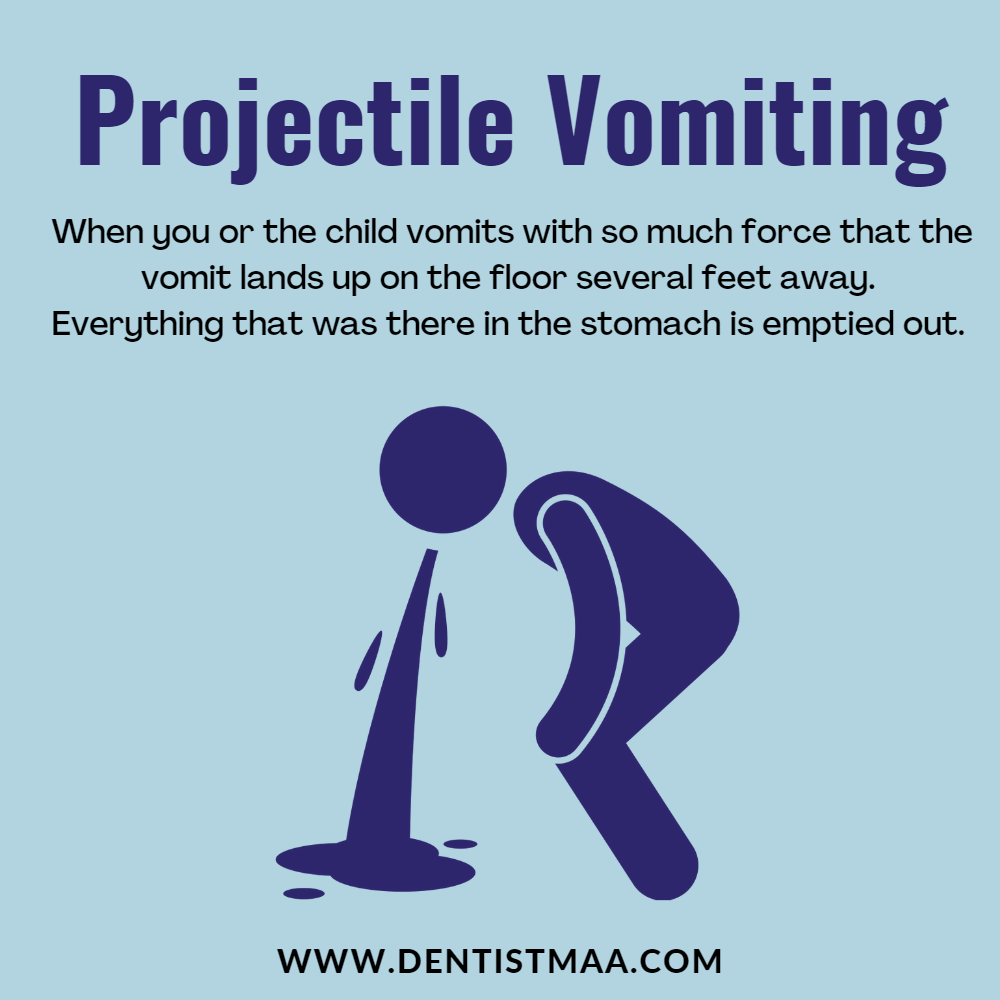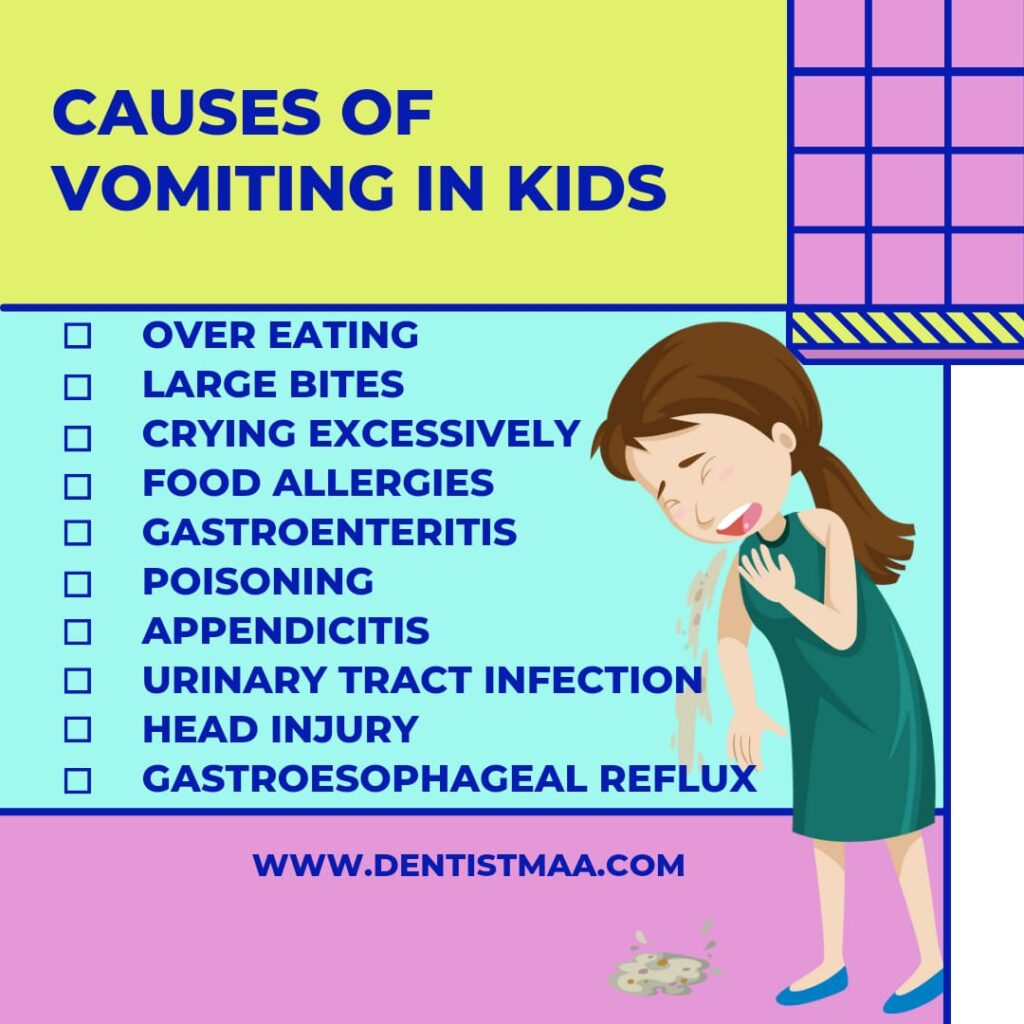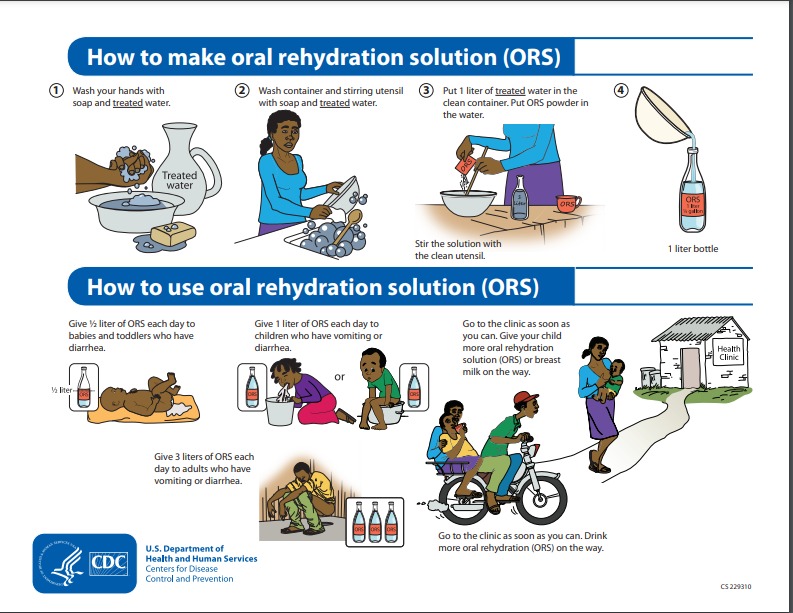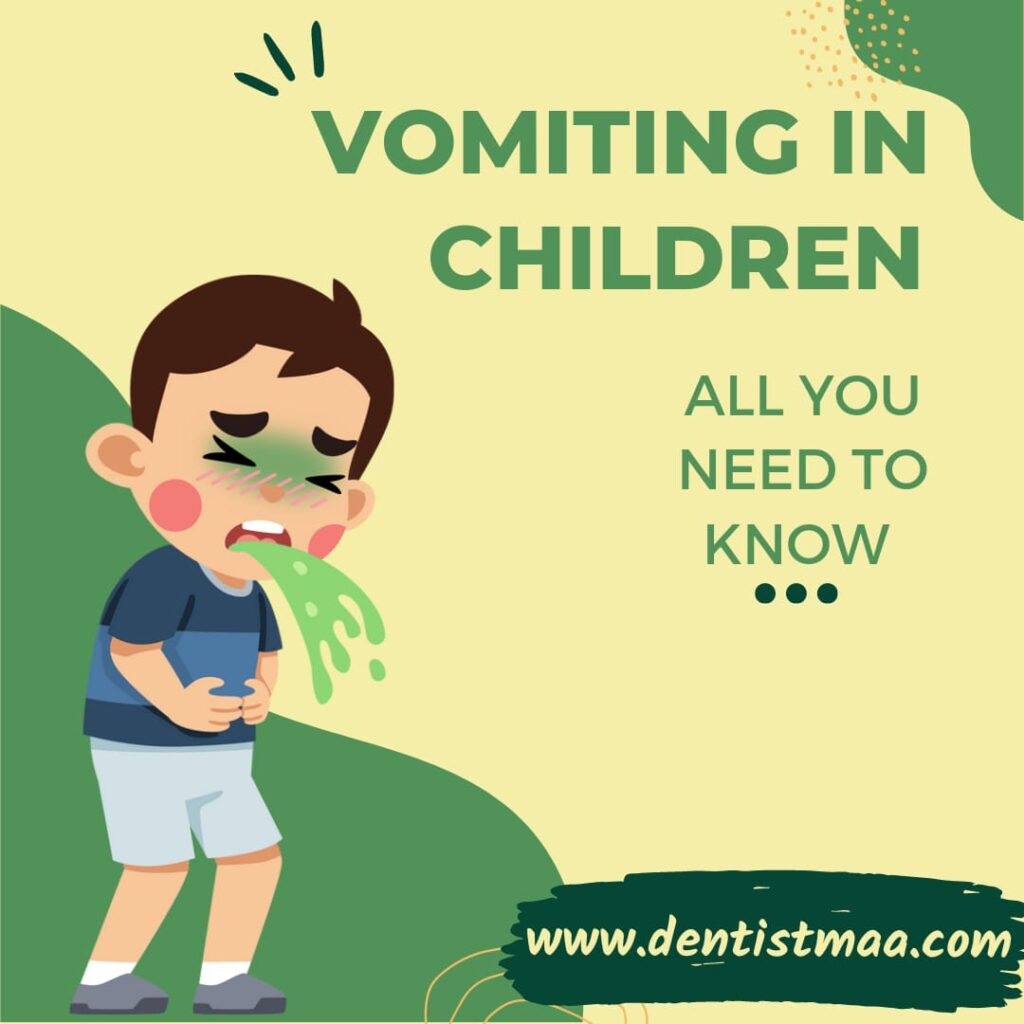Vomiting is very commonly seen in young children and becomes a matter of concern for the parents, care givers or teachers. Proper analysis, diagnosis and treatment is required if vomiting is continuous.
What is Nausea and Vomiting?
Nausea is an unpleasant feeling which makes you feel that you might puke or vomit.
Vomiting is the throwing up of the stomach contents forcefully. There can be a lot of reasons for vomiting especially in children, but what is most important is to differentiate between what is a serious problem and what is normal.
You should know when to visit a doctor if your child is vomiting. Normally vomiting in kids is normal and it passes of quickly. But if the vomiting continues, a specialist treatment might be required.
Types of Vomiting
Vomiting can be of different types. This helps in diagnosing what is serious and what is not.
Possetting
Possetting is the small amount of milk which the baby vomits out after you feed the child. Burp the child by resting his or her on your shoulder after every feed.
Reflux
When the food moves up from the child’s stomach and the baby vomits, this is called reflux. the valve of the stomach opens the food comes up through the esophagus. The child slowly out grows it with age. It starts reducing when the child starts walking.
Projectile Vomiting
When the stomach content is forcibly thrown out, it is a projectile vomiting. All the food or the milk from the last feed will be out and it will be a large mess on the floor. If it happens once in a while it is okay, but if it is happening regularly you need to take your child to the doctor.

Causes of Vomiting in Kids?

Over Eating
Over eating is one of the main reasons for vomiting in kids. Sometimes we as parents think that the baby might still be hungry or has not have enough food. But that might not be the case. Kids, especially infants eat very small amount of food, and it is okay. Never every force feed your child.
Let the child decide the quantity of the food. You can offer at short intervals but do not give lot of food at one particular time.
Large Bites
Prefer giving very small bites to your child. The organs are still developing and the children would be comfortable with small bites only. If the child is self feeding make sure to keep small bites in front of the child in the beginning and always supervise the child while they eat.
Crying Excessively
Sometimes when the child cries excessively and uncontrollable, the child might vomit out what he or she just had. It is normal. Just try to console the child and make the child take deep breaths through the nose.
Food Allergies
Food allergies can be another cause of vomiting in kids, and it most likely to be seen in the first year of life as we are introducing everything new to the child.
Cow’s milk is one example of foods that might cause allergy in children. This is one of the reasons pediatricians advise not to give cow milk to a child less than 1 year of age. Slowly with age the child might start out going the allergy. There might be nausea and vomiting, stomach ache and dehydration in kids. The best thing to do is stop giving the milk immediately and visit a pediatrician.
Kids less than 1 year of age should be given breastfeed or formula milk, no animal milk should be introduced till the age of 1 year.
Other food that might cause allergies can be nuts, eggs, soy, fish, wheat, etc.
Gastroenteritis
An infection caused mainly viral source or sometimes bacterial is one of the main reasons for vomiting in children. Nausea, vomiting, diarrhea, abdominal pain and fever are the symptoms of Gastroenteritis.
Rotavirus is one of the main reasons for gastroenteritis in kids. But the good news is vaccine for Rotavirus is available under the Universal Immunization Programme (UIP). It should be given to every child, as kids below the age of 6 months are more prone for gastroenteritis from rotavirus.
Gastroesophageal Reflux
Gastroesophageal Reflux is the backward movement of food and acids from the stomach to the esophagus and the mouth. This can lead to vomiting of the food.
It can be due to position during feeding, due to over feeding or some kind of abnormality in the digestive system tract. If the reflux is very frequent then a pediatric opinion is a must.
Poisoning
Kids tend to put everything in their mouth what ever they see. This is a part of normal development. But if something that is poisonous is swallowed by the child, it might lead to vomiting, dizziness, fits, difficulty in breathing and immediate medical care should be given in such cases.
The best thing to do is to keep anything that might be poisonous out of reach of the child, like good night liquids, mosquito replants, Floor cleaners, etc.
Appendicitis
Appendix is an vestigial organ in our body. If it gets affected there is severe stomach pain and vomiting as well. Do consult a doctor immediately if you see these symptoms.
Urinary Tract Infection
Urinary Tract Infection commonly know as the UTI is one of the reasons for vomiting in children. The other symptoms might include fever, tiredness, frequently urination, pain or burning sensation while peeing, change in color of the urine.
Immediate attention is required and you should take your child to a pediatrician immediately.
Pyloric Stenosis
Pyloric Stenosis is a problem that can affect the babies from birth to 6 months of age. It affects the gastrointestinal tract and anything that the baby is fed (breast milk or formula) is vomited out (projectile Vomiting). Pyloris is the opening between the stomach and the small intestine. During pyloric stenosis there is a narrowing of the pyloris and the stomach content can not be emptied out in the small intestine.
This condition is serious and required immediate attention. It is the second most common cause of surgery in new born. The symptoms are seen approximately around 3-5 weeks after the birth of the child.
Head Injury
Your child fell and vomited. Is this serious? Yes! it is serious.
Head injury is another reason for vomiting in children as well as adults, and should be dealt with carefully without any delay at all. Take your child to an emergency department immediately if your child has vomited after a fall or a hit on the head, even if the child appears normal. A routine examination by a professional is a must.
Signs and Symptoms of Vomiting
- Vomiting can be the only symptom some times.
- Nausea can proceed vomiting in some cases.
- Stomach pain can be another symptom seen along with vomiting.
- Fever is again another symptom that can be seen during vomiting when the cause is any kind of infection.
- Diarrhea can also bee seen with vomiting, leading to dehydration.
- Loss of appetite is another common symptom seen with vomiting.
What can I do at home?
The first thing to do is to know the reason of the vomiting. If you are not able to identify the cause, visit a doctor immediately. If the reason is over feeding, excessive crying, coughing excessively or if the child took a large bite and vomited then you just take care of the child at home and not worry much.
In case of Gastroenteritis, only very mild cases should be treated at home. If your child is having mild dehydration, and has vomited once or twice, try to keep the child hydrated. Give ORS (Oral Rehydration Solution) to the child, give water and other fluids. For a child less than 6 months, you can keep feeding the child breast milk or formula milk if the child is not throwing up repeatedly.
How to make ORS at home?
The ORS packets are the best. But if they are not available, it can be made at home. Follow the steps.
- Take 1 liter of clean water. 1 cup has approximately 200 ml, so 5 cups will make one liter if you do not have anything else to measure.
- Put 6 leaved tea spoons of sugar.
- Half level teaspoon salt.
- Mix the ingredients well till the sugar dissolves.

How to use Oral Rehydration Solution
Never force feed a child if the child is not eating or drinking much.
Do not self medicate the child.
You can give light food like rice, curd, butter milk, fruits, vegetables to your child. If the child says he or she doesn’t want to eat more, stop.
If the child is vomiting continuously, visit a doctor.
When do I need to Visit the Pediatrician?
Visit a pediatrician immediately if:
- The child is vomiting continuously.
- The child is not eating or drinking anything since several hours.
- The child is dehydrated. The few signs can be, peeing less, crying with little or no tears, dry lips, lethargic, not responding properly, sleeping a lot.
- The child has a fever.
- The child is having a stomach ache.
- The child is having loose stool along with vomiting.
- The child has vomited after a head injury.
- The child has been vomiting since more than 24 hours.
- If the child is under 6 months of age.
- There was blood in the vomit.
What are the Treatment Options
The treatment for vomiting depends on the diagnosis. Depending on the diagnosis the pediatrician will recommend the treatment. The major concern is to prevent dehydration in the child and give fluids.
Vomiting in kids mainly doesn’t last for more than 24 hours and if it does, never self medicate the child or depend on the home remedies, immediately visit a doctor. Self medication is the worst form of treatment.
Vomiting: Frequently Asked Questions
When should I worry about my child’s vomiting?
If your child has been vomiting for more than 24 hours, and not eating or drinking well, you need to take your child to the pediatrician right away.
How do you stop vomiting fast for kids?
ORS (Oral Rehydration Solution) is one of the best solution for stopping vomiting for kids and preventing dehydration. Avoid solids and give more of fluids to your child. Do not force feed at all.
What would cause vomiting with no other symptom?
An allergy to food or milk products or to some medication can be the reason for vomiting with no other symptoms. Viral gastroenteritis is another cause of vomiting.
Should I call a doctor if my child is vomiting?
If your child has been vomiting continuously, not drinking anything at all or is vomiting for more than 2 days, it is time to call a doctor.
What home remedy stops vomiting?
ORS is the best home remedy to stop vomiting and dehydration. Give plenty of fluids to your child, but do not force feed.
Disclaimer:
This blog provides general information about vomiting in children. The opinion and content on this blog is only for conversational purposes and should not be interpreted as medical advice pertaining to any particular individual. If the reader or any other person has a medical concern, he or she should consult with an appropriate licensed medical physician or a health care provider.
Read: First Dental Visit for Children
baby names Baby teeth bad breath bleeding gums Books brushing Brushing teeth caries cavities Child Children cough dental health dentist endodontist Gift Ideas gums halitosis Healthy Teeth kids latest indian baby names 2022 love maa Milk teeth modern indian baby names 2022 mother oral health oral hygiene Parenting parents perfect gift ideas permanent teeth post root canal instructions puzzles rct root canal root canal treatment stress teeth Teething tooth toothbrush toothpaste treatment wisdom tooth





Pingback: 14 Terrific Benefits of Jigsaw Puzzles for Kids - DentistMaa
Nice explanation about Vomiting in children
thank you so much 🙂